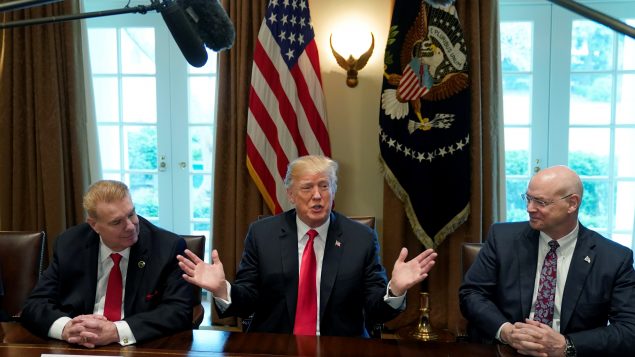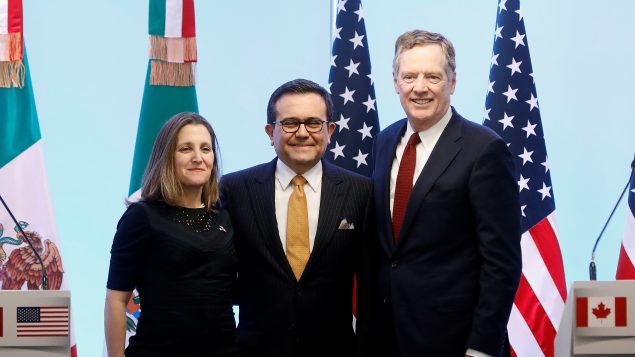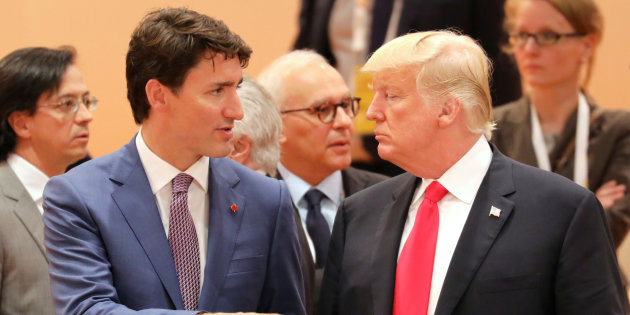Prime Minister Justin Trudeau called U.S. President Donald Trump Monday evening to register ‘his serious concern’ about the U.S. administration’s plan to impose steep tariffs on imports of steel and aluminum, according to a read-out of the phone call from the Prime Minister’s Office.
The two leaders also discussed the latest round of NAFTA negotiations that in closed in Mexico City on Monday, and welcomed the progress that is being made in negotiations, according to the readout.
However, Trudeau “emphasized that the introduction of tariffs would not be helpful to reaching a deal on NAFTA.”
According to the readout of the same conversation provided by the White House, “Trump emphasized his commitment to a NAFTA agreement that was fair to all three countries, noting the current agreement leaves the United States with a trade deficit.”

Chairman, CEO and President of Nucor John Ferriola and U.S. Steel CEO Dave Burritt flank U.S. President Donald Trump as he announces that the United States will impose tariffs of 25 percent on steel imports and 10 percent on imported aluminum during a meeting at the White House in Washington, U.S., March 1, 2018. (Kevin Lamarque/REUTERS)
Trump tweeted Monday he would only relieve Canada from the tariffs he has been threatening on steel and aluminum if a “new and fair” North American Free Trade Agreement is signed.
Last week, Trump announced that hefty new tariffs for imports of steel, at 25 per cent, and 10 per cent for aluminum are being imposed ostensibly on national security grounds under Section 232 of the Trade Expansion Act of 1962.
In 2017, the U.S. imported 26.9 million tonnes of steel, with 16 per cent of it coming from Canada.
Describing itself as a key ally of the U.S. through the bilateral North American Aerospace Defence Command (NORAD) and NATO, Canada has been seeking an exemption, but has also threated to retaliate if the U.S. does indeed go ahead with tariffs on Canadian steel and aluminium.
Canada also says it’s unacceptable to link the steel and aluminium tariffs to the progress on renegotiating NAFTA.

Canadian Foreign Minister Chrystia Freeland, Mexican Economy Minister Ildefonso Guajardo and U.S. Trade Representative Robert Lighthizer pose for a photo during a joint news conference on the closing of the seventh round of NAFTA talks in Mexico City, Mexico March 5, 2018. (Edgard Garrido/REUTERS)
At the conclusion of the seventh round of NAFTA talks in Mexico City the U.S. side registered a renewed sense urgency to complete the talks before the presidential elections in Mexico in July and the Congressional midterm elections in the U.S.
“All of this complicates our work,” said U.S. Trade Representative Robert Lighthizer in his remarks during Monday’s joint statement with Canadian Foreign Affairs Minister Chrystia Freeland and their Mexican host Economy Minister Ildefonso Guajardo.
“I fear the longer we proceed, the more political headwinds we will feel.”
Lighthizer noted that despite the hard work by the negotiators the parties have not made a lot of progress and are running against the clock with only six out of the 30 NAFTA chapters being closed before the final eighth round at the end of March.







For reasons beyond our control, and for an undetermined period of time, our comment section is now closed. However, our social networks remain open to your contributions.